Cultivating Curiousity
Pedalogical Tools and Student-Led Projects
September 4, 2025
About Me
Teaching Areas
- Intro to Programming
- Data Structures
- Algorithms
- Software (Mobile Dev, Game Dev)
- SQL & Data Engineering
- CS Capstone & DS Capstone
Research Areas
- Educational Technology & AI-Powered Learning
- Software Testing & Security Education
- Human-Centered Design in Computing Education
- Student-Driven Innovation Projects

🚪 Ford Hall, Room 210
📬 lpcordova@willamette.edu
🌐 lpcordova.com
Overview
1. Research on pedagogical tools
2. Student-led innovation projects
The Challenge
How can we create educational experiences that resonate long after the lesson ends?
- Moving beyond traditional passive learning
- Empowering student ownership and reflection
- Bridging theory and practice in education
- Creating memorable, lasting learning moments
- Leveraging technology to enhance learning
The Vision
“Where learning adapts and technology empowers.”
- Tools that adapt to individual learning styles
- Experiences that bridge classroom and career
- Technologies that empower rather than replace human connection
Pedalogical
Pedalogical
Transforming Learning Through Deep Reflection
- AI-powered platform for creating personalized learning experiences
- Empowers students to claim ownership of their learning journey
- Grounded in learning theories
Built by Students, for Students!
Developed with contributions from 6 students over the last year:
- Teo Mendoza (CS)
- Gavin Smith (Physics)
- Sam Holmes (Math/CS)
- Shouvik Ahmed Antu (CS/DS)
- Ben Webster (CS/DS)
- Derec Gregory (CS/DS)
- Josh Torres (Psychology)
Theoretical Foundations
Learning Theories Informing Our Design
- Constructivism (Bruner, 1990): Students build knowledge through experience
- Cognitive Load Theory (Sweller, 1988): Optimizing mental effort for learning
- Self-Regulated Learning (Zimmerman, 2000): Ownership drives motivation
- Bloom’s Taxonomy (Anderson & Krathwohl, 2001): Moving from knowledge to creation
Pedagogical Strategies Enabled
Assessment Methods
- Formative Assessment: Continuous feedback to guide learning
- Summative Assessment: Evaluating mastery at course end
- Self-Assessment: Fostering metacognitive skills
- Bloom’s Taxonomy (Anderson & Krathwohl, 2001): Moving from knowledge to creation
Question Types
- Multiple Choice: Quick checks for understanding
- Matching: Reinforcing connections
- Process: Step-by-step comprehension
- Feynman: Deepening understanding through explanation
Blueprints, Journeys, and Nodes
- Blueprints: Structured templates guiding learning paths
- Journeys: Personalized learning experiences crafted by students
- Nodes: Individual learning activities or reflections
Feynman Technique
Explaining concepts in one’s own words enhances retention and comprehension
Unstructured Chatbot
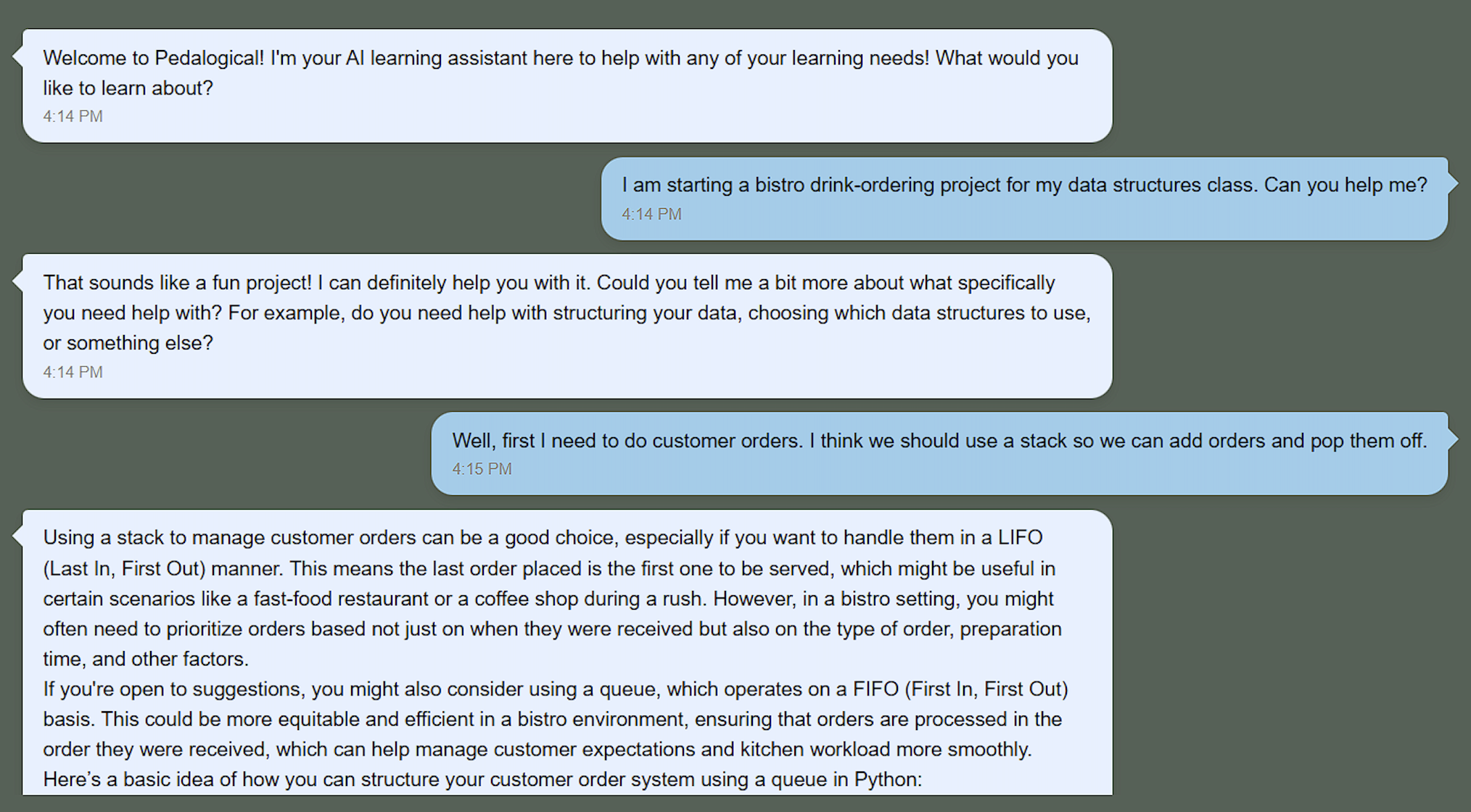
Figure: Unstructured Chatbot
Pedalogical Chatbot
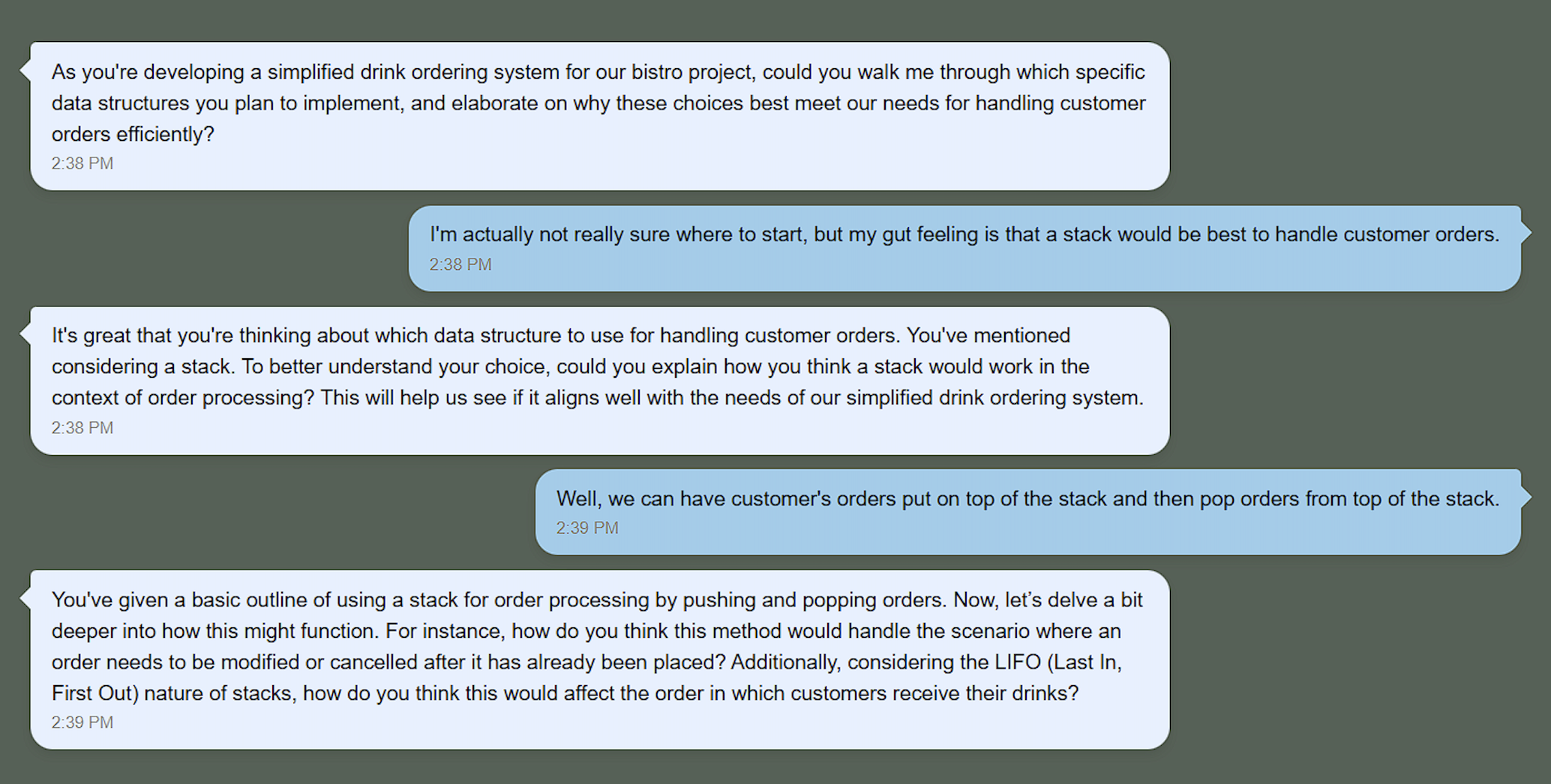
Figure: Pedalogical Chatbot
Demonstration
Pedalogical in Action
Willamette University - Data Structures Study
- Focus: Evaluating the effectiveness of a structured versus unstructured chatbots
- Context: Students were asked to use the chatbot to design a medium-sized data structures project
- Key Finding: Students using the structured chatbot performed 20% better on project outcomes suggesting increased metacognitive awareness and problem-solving strategies
- Status: Publication under review
Preliminary Results Barchart
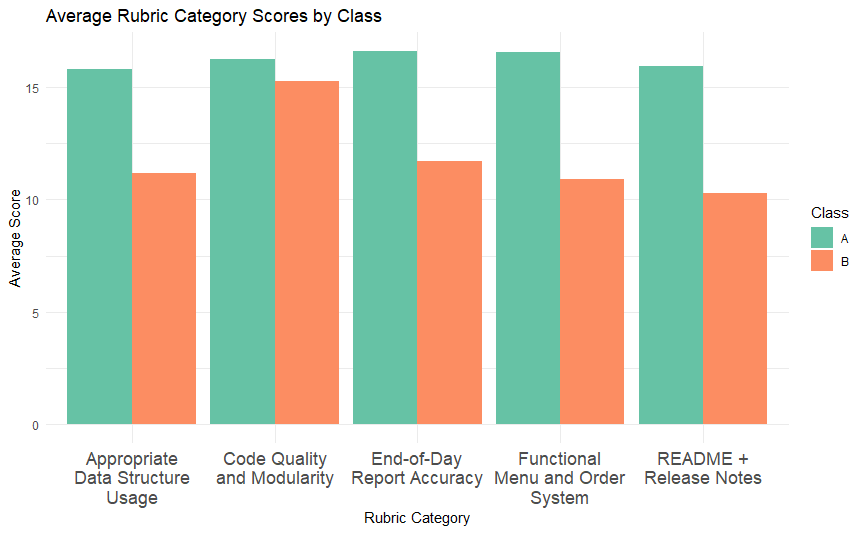
Figure: Barchart comparing project scores between structured and unstructured chatbot users
Preliminary Results Boxplot
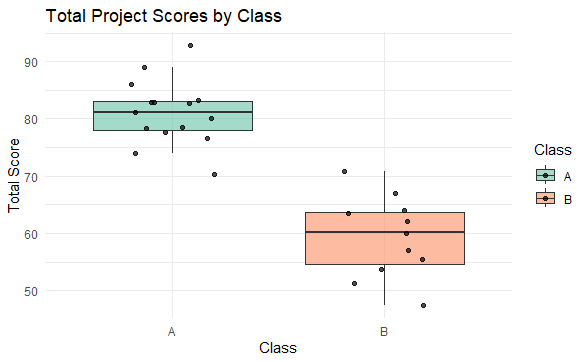
Figure: Boxplot comparing project scores between structured and unstructured chatbot users
Future Directions
Expanding Pedalogical’s Impact
- Integrating AI-driven adaptive learning paths
- Collaborating with educators for diverse applications
- Conducting longitudinal studies on learning retention
- Open-sourcing the platform for broader access
Testing Tutor
Testing Tutor
- Focus of an NSF grant awarded
- Dynamic tool transforming software testing practice by focusing on conceptual feedback over detailed feedback
- Validated previously through studies at Western Oregon University, Oregon Institute of Technology, University of Alabama, and Augusta University
From Testing Practice to Security Mindset
- Expanded focus to include security vulnerability identification
- Encourages students to think like attackers, enhancing defensive coding skills
- Promotes deeper understanding of software security principles
- Integrates experiential learning theory (Kolb, 1984)
- Utilizes Pedalogical’s backend
Current Testing Tutor Studies
Augusta University
- Focus: Vulnerability Analysis
- Status: Publication accepted ✓
- Impact: Students identified 40% more security vulnerabilities after training
University of Alabama
- Focus: Software Testing Concepts
- Status: Publication under review
- Application: Full semester integration in testing courses
Student-Driven Innovation
Student-Driven Innovation
Rae’s Room: Authentic Connections
A Social Network for Chinese American Adoptees
Project Overview
- Niche social networking platform
- Focus on authentic cultural connections
- Built with React Native
- Students: Sam Holmes, Saul Ifshin, Rae Ota
Research Angles
- Cultural usability
- Social networking dynamics
- Privacy considerations
- Cross-platform development
Join Our Team!
We’re looking for interested students to contribute to this meaningful project
Giant Pumpkin Soil Amendment Solver
Pumpkin Growth Optimization System
- Innovation: Determines precise nutrient values for award-worthy giant pumpkins
- Impact: Helping growers “chase new heights”
Upcoming Events
Don’t Miss!
Join us for Ellann Cohen’s talk
📅 September 18th
Learn how technology meets tradition in competitive pumpkin growing!
Ellann’s 2025 Harvest
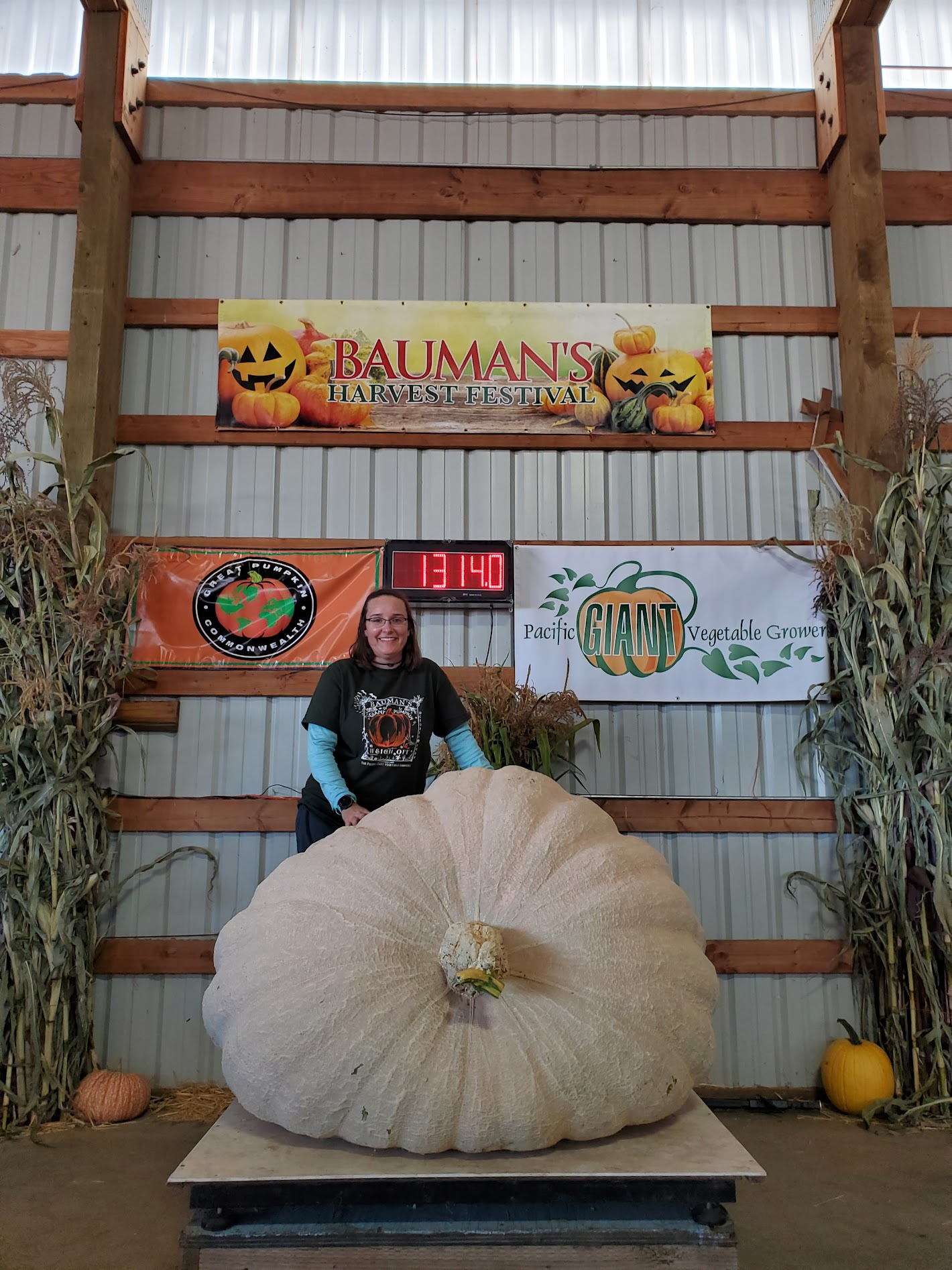
Figure: Ellann Cohen with her giant pumpkin
Future Directions
Illuminating the Path Forward
- Expanding AI integration in educational tools
- Cross-institutional collaborations
- Open-source educational technology development
- Student-led research initiatives
Get Involved!
Opportunities for Collaboration
For Students
- Join Rae’s Room development team
- Contribute to Testing Tutor modules
- Propose new research projects
For Educators
- Pilot our tools in your courses
- Collaborate on research studies
- Share feedback and insights
Thank You!
Questions & Discussion
Contact: LPCordova@willamette.edu
Lab Website: lpcordova.com
Current Projects:
- Pedalogical Platform
- Testing Tutor
- Rae’s Room
- Smart Agriculture Systems
References
- Anderson, L. W., & Krathwohl, D. R. (2001). A taxonomy for learning, teaching, and assessing
- Bandura, A. (1977). Social learning theory
- Bruner, J. (1990). Acts of meaning
- Flavell, J. H. (1979). Metacognition and cognitive monitoring
- Kolb, D. A. (1984). Experiential learning
- Piaget, J. (1973). To understand is to invent
- Schön, D. A. (1983). The reflective practitioner
- Vygotsky, L. S. (1978). Mind in society
- Zimmerman, B. J. (2000). Self-regulated learning and academic achievement